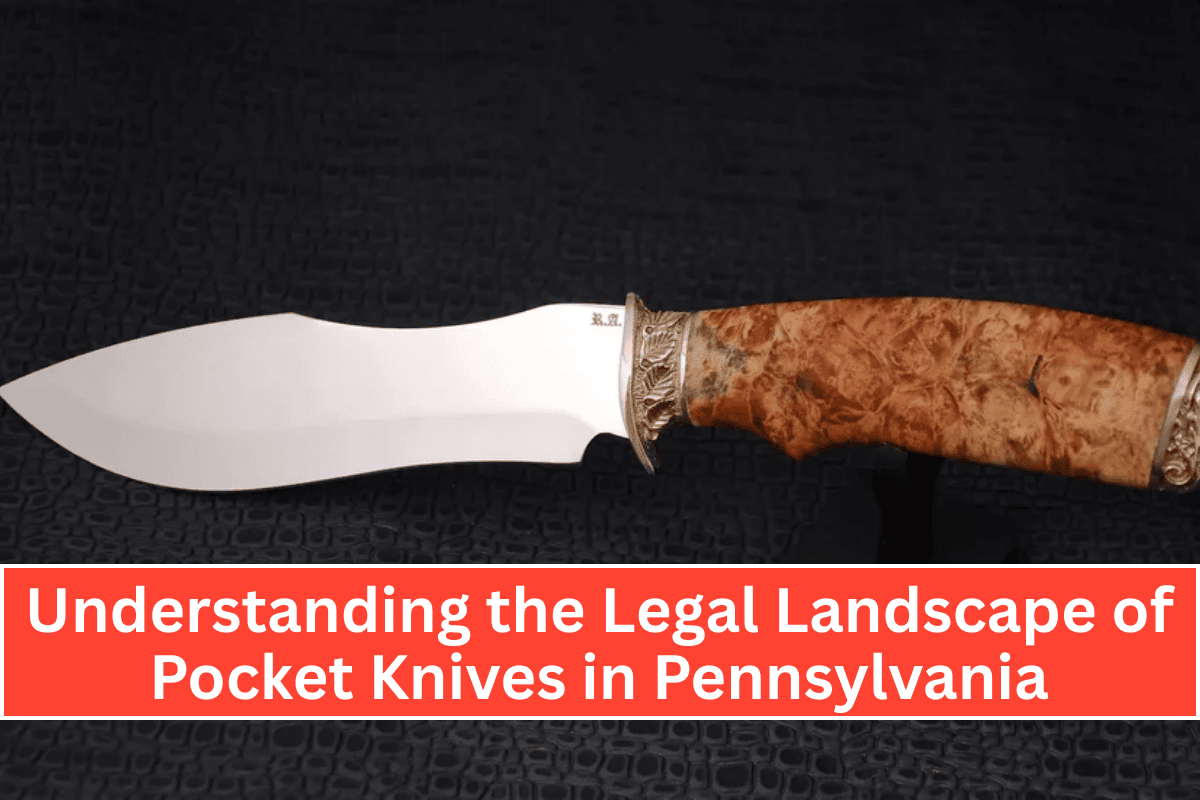In Pennsylvania, knives are commonly carried for various purposes, such as sports, outdoor activities, and crafts. While knives are less regulated than firearms, the state still imposes specific laws to ensure that these tools are used safely and legally.
It’s important for knife enthusiasts, hobbyists, and collectors to understand these laws in order to avoid unintended legal issues. This article explores the nuances of Pennsylvania’s knife regulations, including what types of knives are legal to own, carry, and use.
Overview of Knife Laws in Pennsylvania
Pennsylvania’s knife laws are straightforward, but understanding them requires familiarity with key definitions and historical context.
While knives are generally legal to possess, certain types are classified as offensive weapons and are illegal to carry. The law makes a distinction based on how knives operate, with automatic-opening knives being heavily restricted.
Legal Blade and Knife Types
Automatic knives (also known as switchblades) are banned in Pennsylvania. These knives open by the push of a button or spring action. They are classified as offensive weapons due to their potential for harm and are not allowed to be carried or sold.
This regulation is tied to the Federal Switchblade Act of 1958, which banned switchblades across the United States, including Pennsylvania.
However, Pennsylvania does allow certain types of knives that open with some assistance but require a small manual push to open, such as assisted-opening knives. These knives are legal to carry and use, provided they serve a common lawful purpose, such as for hunting or as everyday tools.
Restricted and Prohibited Knives
While the state allows many types of knives, there are a few that remain prohibited under Pennsylvania law. Some of the banned knives include:
Switchblades: Knives that open automatically at the push of a button.
Ballistic knives: Knives that launch a blade as a projectile.
Gravity knives: Knives that open by the force of gravity or a spinning motion, often considered dangerous due to their quick deployment.
These knives are banned because of the potential threat they pose, especially in public spaces.
What Knives Are Legal to Own in PA?
Pennsylvania law permits ownership of many types of knives, as long as they don’t open automatically. These knives include:
Pocket knives
Hunting knives
Butterfly knives (as long as they don’t open automatically)
These knives are legal to possess, own, and use for recreational or professional purposes. Folding knives, especially those with a blade less than four inches, are commonly carried for everyday tasks and are widely accepted in Pennsylvania.
Curio and Lawful Purpose Exceptions
One unique aspect of Pennsylvania’s knife laws is the curio exception. This exception allows individuals to legally own certain knives that are otherwise prohibited, as long as they are used for lawful purposes.
For example, collectors may own switchblades or ballistic knives as long as they are kept for display or other lawful reasons, such as historical or cultural interest.
Similarly, knives like katana swords may also be permitted if they are used for specific purposes such as martial arts or display.
Carrying Knives in Pennsylvania
Understanding the rules about carrying knives in Pennsylvania is vital, particularly when it comes to public spaces and specific locations where knives are prohibited.
Public Spaces and Schools
Knives are prohibited in schools, whether public, private, or charter. The state mandates that local school districts adopt strict codes of conduct, ensuring that knives and other weapons are not brought onto school grounds. Even for adults or staff members, carrying knives on school property is illegal and can result in arrest.
Similarly, courtrooms and government buildings are also knife-free zones. These locations have heightened security to prevent potential violence, and knives are not allowed inside.
Work and Recreational Use
Outside of restricted areas, knives used for work or recreation are generally permissible. Hunting knives, pocket knives, and other tools are often carried by people working in fields such as construction, forestry, or fishing. However, automatic knives and other weapons are not allowed to be carried, even in work settings.
Carrying and Concealment
In Pennsylvania, if you’re carrying a knife concealed, the laws may vary depending on the specific knife type and where you’re carrying it. Concealed carry of a knife is generally not prohibited for knives that are not considered offensive weapons.
However, knives that are designed for combat or have automatic opening mechanisms are illegal to carry concealed.
Penalties for Violating Knife Laws in Pennsylvania
The penalties for violating Pennsylvania’s knife laws can range from fines to imprisonment, depending on the type of knife involved and the specific offense.
For example, carrying an automatic knife or a switchblade can lead to criminal charges, while owning a curio knife without the proper justification could result in fines or other legal consequences.
In the case of possessing a knife with the intent to use it unlawfully, the penalty is more severe. Assault with a knife or other illegal uses of a weapon can lead to long prison sentences, fines, and permanent criminal records.
Understanding and following Pennsylvania’s knife laws is essential for residents and visitors alike. While many knives are legal to own and use, automatic-opening knives and certain others, like ballistic and gravity knives, are prohibited.
By staying informed about the rules for knife ownership, carrying, and usage, you can avoid legal trouble and ensure that you enjoy your knives safely and responsibly.
Whether you’re a knife enthusiast, an outdoor adventurer, or someone who just wants to carry a tool for practical purposes, understanding these laws will help you avoid the risks associated with breaking them.
If you have any doubts about the legality of a specific knife or situation, consulting with a legal professional familiar with Pennsylvania’s weapons laws can offer you peace of mind and protection.












